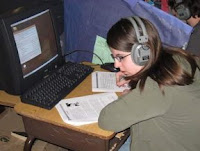Each day in Reading Workshop for about 7 minutes (usually two songs), students sing. Lyrics are shown on the white board using the LCD projector. Music is played and students sing along, reading the lyrics as they sing. Every week, we sing at least one new song. As students get familiar with a song, they know all of the words, so they don't need to read. Changing songs is important to keep students reading. It also helps with vocabulary instruction. With each new song, there are new words to learn and discuss.
The best part of singing in reading class though, is how it helps academic achievement. When students read fluently, the ability to comprehend increases dramatically. Conversely, when students fight to read each word, starting and stopping, and starting again, comprehension decreases dramatically. We have all listened to a student read, struggling with each word, never reading a sentence through, and wished we had a magic bullet. We know if we could just get him to read fluently, he would have a better chance of understanding what he reads.
As we know, there is no magic pill, to cure all ailments. However, with modeling, and repeated readings, students can significantly increase fluency. In fact, primary teachers use this daily. Adolescent learners will quickly turn us off though, if we try to read as a class every day. This just wouldn’t be “cool.” This is where singing plays an important role in the language arts classroom. Singing their favorite new hit is most definitely “cool.”
The available evidence provides reliable, scientific evidence of the positive impact of repeated readings on a variety of reading tasks and outcome measures. These studies also indicate that engaging children in repeated readings of a text is particularly effective in fostering more fluent reading in children who are struggling to develop proficient reading strategies.
What better way for repeated reading than through singing?














